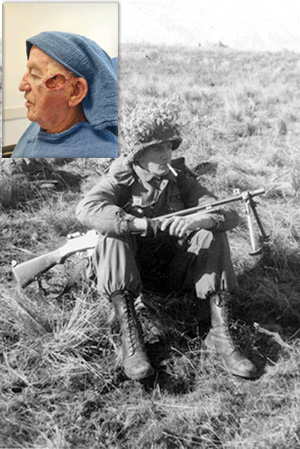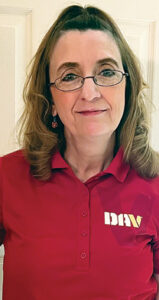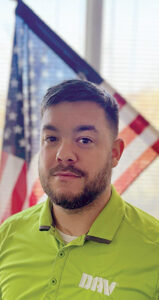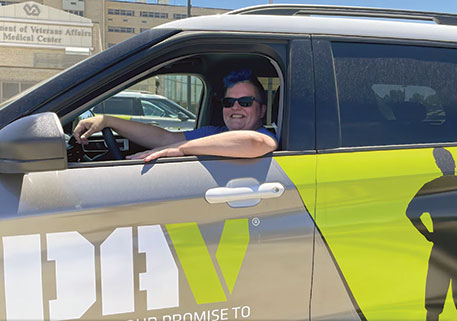
Under the scorching Nevada sun, John McCabe placed his hands over his eyes and spun around in a 3-foot-deep trench. The daylight faded as his fingers laced together firmly. Still, he caught a glimpse of a black object—a bazooka-type projectile—carrying the ability to end wars by flattening cities and incinerating their inhabitants.
Although McCabe’s digits were locked across his face, a violent starburst broke through so brilliantly that his shut eyes transformed into X-ray machines as he saw the bones in his fingers.
McCabe knew what he had just experienced about 65 miles northwest of Las Vegas: a nuclear explosion.
“Guys on my left could have thrown a baseball into it,” said McCabe. “That’s how close we were to the kill zone.”
To decontaminate, the soldiers used brooms to brush off vehicles and themselves.
That was the second of four nuclear detonations McCabe encountered while assigned to the 4th Infantry Division. Unbeknownst to him, the Army wanted to see how a fighting force and their equipment would fare in a nuclear attack.
“I felt permeated by radiation,” said McCabe, who served in the Army from 1960 to 1962. “I was convinced I could feel myself being impregnated by lasting memory.”
McCabe is known as an “atomic veteran,” a title given to those who were exposed to radiation from nuclear weapons. The Department of Veterans Affairs defines an atomic veteran as anyone who “participated in above-ground nuclear testing from 1945 to 1962” or served in Hiroshima or Nagasaki, Japan, following World War II.
The scourge of atomic weapons has stayed with McCabe. He’s undergone 40 surgeries for skin cancer, which he suspects stems from his time at the Nevada test site. However, his mental well-being also suffered, with recurring nightmares where he was flying back to that shallow trench from more than six decades ago.
Despite these ailments, McCabe avoided filing for VA benefits, in part due to threats he and other soldiers received from military officials.
“They put us in a formation and said that if we tell anybody about this, anybody at all, you’ll be fined $10,000 and tried for treason,” said McCabe, who received a top-secret security clearance for the duty.
Congress repealed nuclear secrecy laws in 1996, allowing atomic veterans to speak freely about their involvement during testing.
When he did file a claim in 2014, the VA denied it. Nearly a decade passed before a dejected McCabe walked into the DAV office in Philadelphia at the urging of his niece, a 35-year DAV employee.

“He was always so perplexed, speaking with him about his service and this experiment,” said Christine McClosky, an administrative assistant at the Philadelphia office. “I was almost in disbelief at how he would describe it to me.
“He would talk to me about his health, and I would tell him you should definitely seek benefits.”
McCabe adhered to her advice, and DAV benefits advocates found an error with his 2014 claim. DAV National Service Officer Apprentice Danny Wyatt said McCabe provided evidence that the VA never considered.
“Maybe it was a secret at the time, but he still earned benefits for any conditions he suffered from working in that environment,” said Wyatt.
Wyatt enlisted the help of Joseph Kauffman, a DAV benefits advocate and regional supervisor of DAV sites in five states. The VA error, Kauffman explained, was from a glitch where veterans would mail in evidence, but due to the timing of claims, it wouldn’t make it into the appropriate file before the department decided their cases.
“By [the] VA’s own rule, they were supposed to reopen and adjudicate the claim as if the evidence had been received in time, and they never did,” he added.

Kauffman said he’s hopeful that DAV will be able to secure justice for McCabe, as they will track down all necessary evidence of his radiation exposure.
“I’m just so happy that he’s on the right path and that DAV is going above and beyond for him,” said McClosky.
As for McCabe, for years he considered himself unqualified for veterans benefits, a mistaken but common sentiment among veterans.
“I’m not a combat veteran or somebody that got shot or suffered anything like that,” he said. “I didn’t go to the VA for 16 years because I didn’t want to take up time.
“I felt unworthy of submitting a claim, but I am worthy,” he added.
For more information
DAV supports, H.R. 4566, federal legislation that would remove the undue burden from atomic veterans to prove their exposure when seeking VA benefits and medical care. You can take action on all DAV-supported legislation by signing up for DAV CAN (Commander’s Action Network) at davcan.org.





